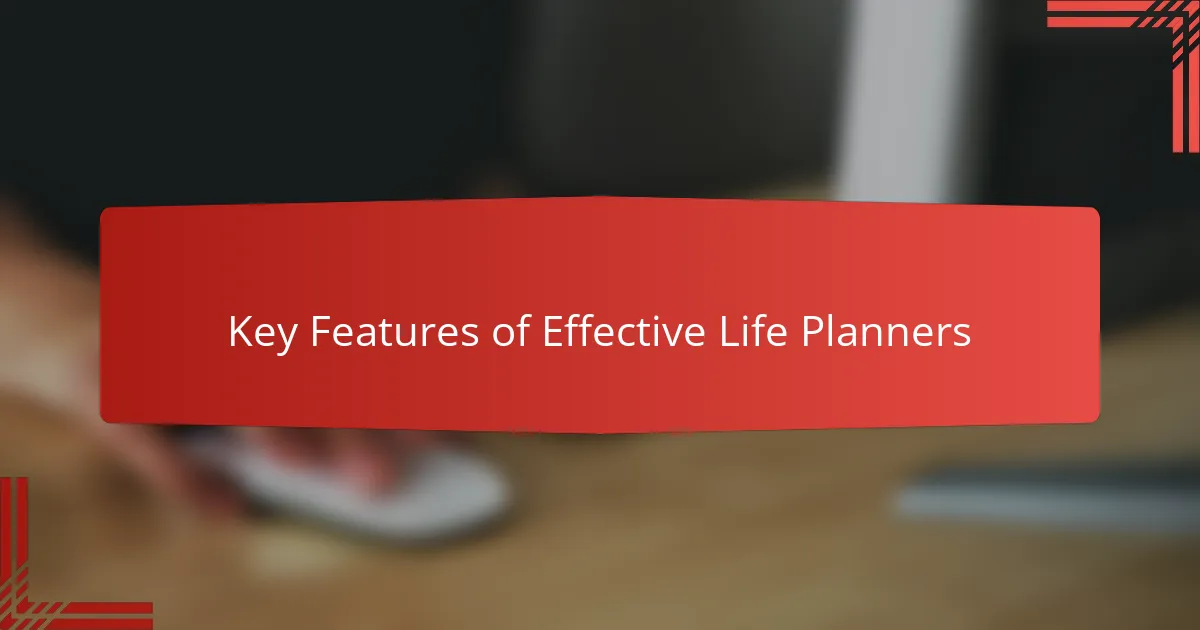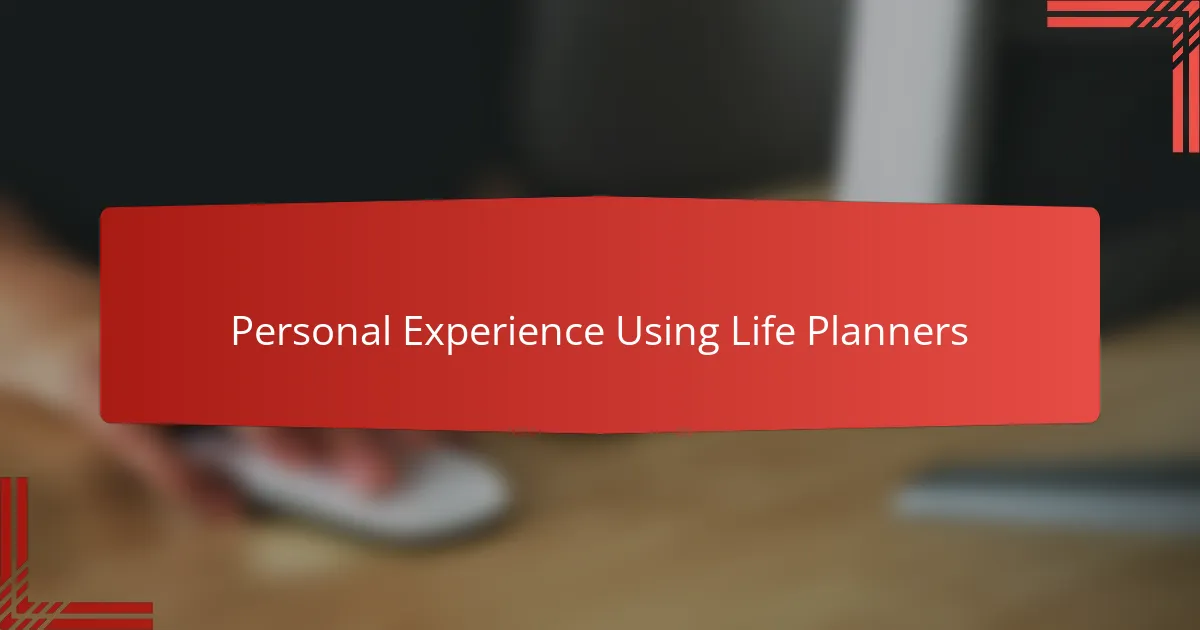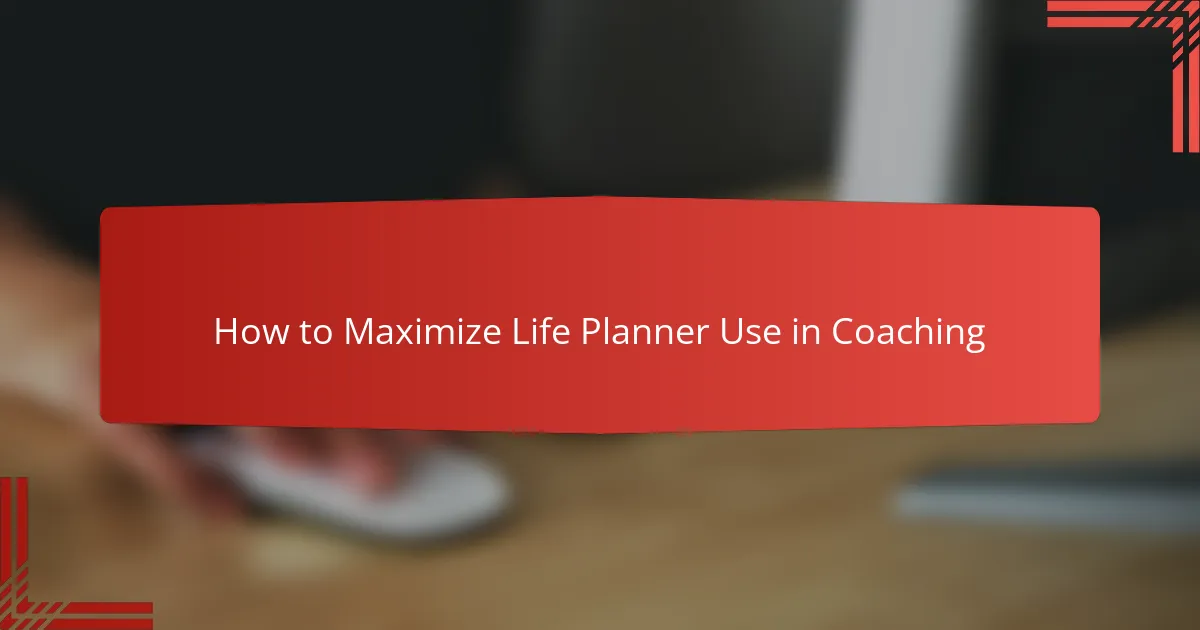Key takeaways
- Life planners convert big goals into manageable steps, fostering motivation and accountability.
- Effective planners prioritize flexibility, clarity, and reflective prompts to enhance personal growth and success tracking.
- Using planners in coaching enhances self-awareness, strengthens community ties, and transforms individual efforts into collective achievements.
- Choosing a planner that matches personal organizing styles and includes reflection space increases consistency and engagement.

Understanding Life Planners for Success
When I first explored life planners, I realized they’re more than just fancy notebooks—they are tools that shape how we view and pursue success. Have you ever felt overwhelmed by your goals? A life planner helps break those giant dreams into manageable steps, making progress feel achievable rather than daunting.
What truly struck me is how a well-structured planner turns abstract ambitions into daily habits. I remember a time when jotting down small wins each day boosted my motivation like nothing else. It’s as if tracking success visibly rewires your mindset from “I’ll try” to “I will.”
Isn’t it fascinating how something as simple as writing things down can create such a powerful momentum? Life planners don’t just organize time—they encourage reflection and intentional living, which to me, is the heart of real success.

Role of Life Planners in Community Coaching
In community coaching, life planners act like bridges between individual aspirations and collective support. I’ve seen firsthand how these planners help clients clarify their goals within a communal context, making their progress feel connected to something bigger than themselves. Doesn’t that sense of shared purpose make the journey more meaningful?
What I appreciate most is how life planners provide a tangible way for coaches and community members to celebrate small victories together. When people track their successes openly, it creates an atmosphere of encouragement that fuels everyone’s motivation. Have you ever noticed how a simple “Well done!” from a peer can make all the difference?
Life planners also foster accountability in a community setting, which is vital for sustained growth. From my experience, when individuals commit to their plans among peers, they’re more likely to follow through because they don’t want to let the group down. This dynamic not only helps maintain focus but also strengthens bonds within the community.

Key Features of Effective Life Planners
One feature I find crucial in an effective life planner is flexibility. Life isn’t static, and neither are our goals. Have you ever started the day with a rigid plan only to realize by noon that it no longer fits your priorities? A good planner allows room to adjust, helping you stay aligned without feeling defeated.
Another key aspect is clarity. When I first used a planner that broke down goals into specific, actionable steps, it was a game-changer. Instead of vague wishes, I saw clear directions, which kept me motivated and focused. It made me realize that clarity isn’t just about knowing what to do—it’s about feeling confident in doing it.
Lastly, I value the integration of reflection prompts in a life planner. Taking a moment to review wins and setbacks daily transformed how I track success. Have you noticed how pausing to reflect deepens your understanding of progress? This feature turns a simple to-do list into a powerful mirror for growth.
![]()
Benefits of Tracking Success with Life Planners
Tracking success with a life planner offers a remarkable sense of achievement. I remember one week when I noted even the smallest victories—finishing a tough task or sticking to a new habit—and suddenly, my confidence skyrocketed. Have you ever felt that boost when you see progress mapped out right in front of you? It’s incredibly motivating.
What really stands out to me is how consistent tracking builds momentum. At first, it may feel tedious, but over time, these recorded successes create a positive cycle that pushes you forward. Isn’t it amazing how a simple daily habit like checking off accomplishments can transform your entire outlook on growth?
Beyond motivation, tracking success in a life planner brings clarity to what’s truly working. When I review my notes, patterns emerge—some strategies click, others don’t—and that insight is priceless. Don’t you find that understanding your progress this way helps you make smarter choices for the future?

Personal Experience Using Life Planners
Using a life planner became a turning point in how I approached my daily routines. I recall mornings when the planner was my first stop—mapping out tasks made me feel prepared and less anxious. Have you ever noticed how starting the day with a clear plan lightens the mental load? That simple act gave me a surprising sense of control.
There was a moment when I hit a creative block, unsure how to move forward with my goals. Yet, flipping back through previous entries reminded me of all I’d already accomplished, pulling me out of doubt. It’s like having a personal cheerleader in paper form encouraging you to keep going, even when motivation wanes.
I also found emotional value in tracking not just tasks, but feelings tied to each success or setback. Writing down how I felt after a win helped me savor the moment longer, fueling my commitment. Don’t you think recognizing emotions alongside achievements makes progress more meaningful? For me, that blend turned planning into a deeply personal journey.

Tips for Choosing the Right Life Planner
Choosing the right life planner felt overwhelming at first because there are so many options out there. What helped me was thinking about how I naturally organize my thoughts—is it more visual, with lots of doodles and color, or do I prefer simple lists? Picking a planner that suits your personal style can make using it feel less like a chore and more like an enjoyable habit.
I also realized that the size and portability matter more than I expected. Have you ever bought a planner that was beautiful but too bulky to carry around? That happened to me, and I quickly stopped using it. Finding a balance between enough space to write and convenience to carry makes a big difference in staying consistent.
One tip I swear by is checking if the planner offers space for reflection or mood tracking. For me, that feature transformed a regular schedule into a tool for self-awareness. Have you ever noticed how pausing to jot down your feelings or lessons learned helps keep your progress authentic and deeply motivating?

How to Maximize Life Planner Use in Coaching
To get the most out of a life planner in coaching, I recommend starting every session by reviewing the planner together. This simple act helps both coach and client anchor their conversation in real progress, making abstract goals tangible and measurable. Have you tried this yet? From my experience, it immediately turns vague ideas into actionable steps, boosting clarity and commitment.
Another key strategy is to encourage clients to use their planners not just for scheduling, but as tools for reflection. When I guided someone to jot down not just their tasks but also their feelings and obstacles, it deepened their self-awareness and made coaching more impactful. Isn’t it surprising how a few notes on emotions can shift the entire coaching dynamic?
Finally, consistently linking planner entries to community support adds a powerful layer of motivation. I’ve seen clients thrive when they share their planner milestones with peers—they transform isolated efforts into shared victories. Doesn’t celebrating small wins together make the journey feel less lonely and far more energizing?